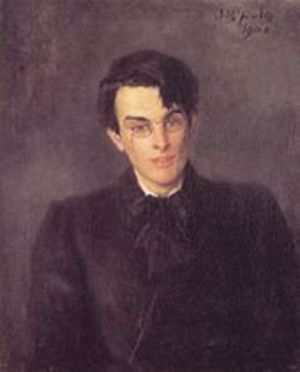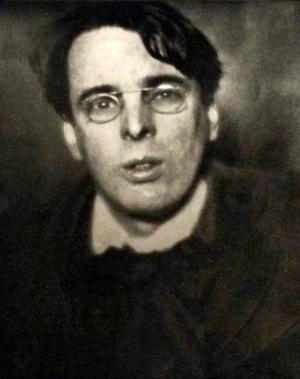William Butler Yeat’s poem “No Second Troy” is undoubtedly about Maud Gonne. Yeats met Gonne in 1889 and she quickly became the object of his unwavering affection. She became the heroine and inspiration of his poetry from then on. Yeats was awarded the Noble Prize in Literature in 1923; however he is considered to be […]
Tag Archives: Yeats
W.B. Yeats’ poem “The Second Coming” was written in 1919, just one year after WWI ended. The beginning of this poem reflects on how evil has taken over the minds of good Christians, and the world has turned into chaos. It is apparent that Yeats believes that a Second Coming is at hand, and he […]
William Butler Yeats: great Irish nationalist, winner of the Nobel Prize for Literature in 1923, and author of great poetry, plays, and prose. Yeats was deeply into occultism and mysticism, and was also active politically in Ireland. His failed love life and depressing environment led to his pessimistic works. One of Yeats’ greatest works, “The […]
Although no other story is more widely known than the life of Jesus, no other story from any other religion has caused more debate to arise. In The Magi, Yeats focuses on the birth and death of Jesus’ life. Written in 1914, The Magi follows the journey of the “unsatisfied ones” and their unrequited search […]
“Everything falls and is built again,” murmurs William Butler’s speaker of Yeats’s poem, Lazuli. The rude speaker, when he contends that art is superfluous in hard and cold things, denies that not only art is necessary, but also that the artists themselves preserve the subsistence of the world. Saying that the system of life depends […]
One of the foremost poets of the English language, W.B. (William Butler) Yeats was born in County Dublin, Ireland, on June 13, 1865, [2] He took an early liking to poetry and was fascinated by both Irish legends and the occult. William was home-schooled until he was nearly 12, where his mother spiced the lessons […]
William Butler Yeats’ poem “Sailing to Byzantium” is concerned with the passage of time, and how someone can become eternal. Yeats lived from 1865 to 1939; so this poem, which was written in 1926, reflects his fears about aging and becoming irrelevant. The narrator of this poem is concerned with the idea of the human/animal […]
William Butler Yeats, born 1865, rose to prominence as a worldwide literary figure during his lifetime and secured his position as the most well-known Irish poet unto this day. W.B. Yeats, who won the 1923 Nobel Prize in Literature, spearheaded the Irish Literary Revival. Also a playwright, Yeats founded the famous Abbey Theatre with other […]
The Desolation Without Sun: an Analysis of Auden’s Line Each line of a poem represents a carefully crafted piece of artistry that supports the whole work. Via intentionally placed words, punctuation, and sounds, a poem moves forward with athletic quickness or slow realization. In the first stanza of W.H. Auden’s In Memory of W.B. Yeats, […]

